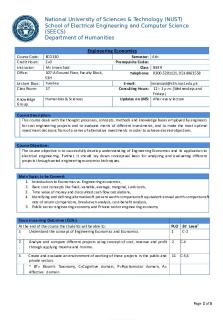Eco 1020 Course Outline PDF

| Title | Eco 1020 Course Outline |
|---|---|
| Course | Econ Management for Tech |
| Institution | Memorial University of Newfoundland |
| Pages | 3 |
| File Size | 168.7 KB |
| File Type | |
| Total Downloads | 63 |
| Total Views | 136 |
Summary
Download Eco 1020 Course Outline PDF
Description
Faculty of Humanities and Social Sciences
ECONOMICS 1020, Section 1: Introduction to Macroeconomics Fall 2020 Instructor:
Sherine Khattab
Office:
Remotely delivered
E-mail:
[email protected]
Required Textbook: Michael Parkin and Robin Bade (2019) Macroeconomics: Canada in the Global Environment Plus MyEconLab, Tenth Edition, 10/e. Make sure to purchase access to MyEonLab so that you can complete the assignments. You will receive instructions about how to register for MyEconLab at the beginning of the term. Lectures:
Monday, Wednesday and Friday 12:00 pm- 12:50 pm
Office hours:
email anytime at “[email protected]”
Evaluation Procedure: 2 midterms
40 % (20% each)
Assignments
10 % (electronic assignments)
Final Examination
50 %
Test Schedule (tentative): Test Midterm one Midterm two Final exam
Date Week 5 Week 10 TBA
Academic Integrity: Students are expected to maintain academic integrity in the course and in the economics program. Cheating on tests will be dealt with in accordance with the procedures outlined under Academic Misconduct (see www.mun.ca/regoff/calendar/sectionNo=REGS-0748 1
Students must have an appropriate classroom demeanor: On occasion less serious students disturb others’ learning during class, by talking at inappropriate times, using the Internet and/or using cell phones. Students distracted by any such behaviour should bring this to the attention of the course instructor. Learning Outcomes: Upon successful completion of this course, the student will be able to: 1. Understand and be able to analyze the economic behaviour of individuals and firms within a capitalist economy. 2. Understand the basic techniques that economists use to communicate their results. 3. Feel familiar with the basic jargon used to model microeconomic behaviour. Notes:
Students are required to check their emails and D2L on a daily basis. All marks, announcements, or any information will be posted on D2L and/or via MUN email. Any changes in the course outline, test dates, marking or evaluation will be discussed in class prior to being implemented. Any concern regarding the marks record (posted on D2L) should be brought to the instructor attention no later than 1 week after the posting date. No reconsideration of marks other than the final exam will be made after the final exam has been written. Students are encouraged to bring lecture notes and reading material with them each class. Cellular phones or electronic devices are not allowed during the class time. Students cannot make a visual and/or audio recording, openly or surreptitiously, of any lecture material delivered in the course. I am committed to facilitating and promoting an accessible, inclusive, and mutually respectful learning environment. Students requiring special accommodation are asked to communicate firstly with the Glenn Roy Blundon Centre (www.mun.ca/blundon) at the earliest opportunity. University policies and procedures pertaining to accommodations for students with disabilities can be found at www.mun.ca/policy/site/policy.php?id=239
2
Preliminary Course outline: DATES & TOPIC Week 1 Chapter 1 Week 2 Chapter 2 Week 3 Chapter 3 Week 4 Chapter 4 Week 5 Chapter 5 Week 6 Chapter 6 Week 7 Chapter 7 Week 8 Chapter 8 Week 9 Chapter 9
Week 10 Chapter 10 Week 11 Chapter 11 Week 12 Chapter 12 Week 13 Chapter 13 and 14
CLASS CONTENT, REQUIRED READING & EVALUATION Read chapter one: What is Economics? from your textbook Read chapter two: The Economic Problem from your textbook
Read chapter three: Demand and Supply from your textbook
Read chapter twenty: Monitoring the Value of Production: GDP from your textbook Read chapter twenty one: Monitoring Jobs and Inflation from your textbook
Read chapter twenty two: Economic Growth from your textbook Read chapter twenty three: Finance, Saving, and Investment from your textbook Read chapter twenty four: Money, the Price Level, and Inflation from your textbook Read chapter twenty five: The Exchange Rate and the Balance of Payments from your textbook Read chapter twenty six: Aggregate Supply and Aggregate Demand from your textbook Read chapter twenty seven: Expenditure Multipliers from your textbook
Read chapter twenty eight: The Business Cycle, Inflation, and Deflation from your textbook Read chapter twenty nine and thirty: Fiscal Policy and Monetary Policy from your textbook
3...
Similar Free PDFs

Eco 1020 Course Outline
- 3 Pages

Engineering Eco. Course Outline
- 5 Pages

Course Outline
- 13 Pages

Course Outline
- 26 Pages

Course Outline
- 13 Pages

Course outline
- 2 Pages

Course outline
- 14 Pages

Course outline
- 3 Pages

Course Outline
- 22 Pages

Course Outline
- 22 Pages

Course Outline
- 3 Pages

Course outline
- 6 Pages

Course Outline
- 16 Pages

Course outline
- 20 Pages

Course Outline
- 19 Pages
Popular Institutions
- Tinajero National High School - Annex
- Politeknik Caltex Riau
- Yokohama City University
- SGT University
- University of Al-Qadisiyah
- Divine Word College of Vigan
- Techniek College Rotterdam
- Universidade de Santiago
- Universiti Teknologi MARA Cawangan Johor Kampus Pasir Gudang
- Poltekkes Kemenkes Yogyakarta
- Baguio City National High School
- Colegio san marcos
- preparatoria uno
- Centro de Bachillerato Tecnológico Industrial y de Servicios No. 107
- Dalian Maritime University
- Quang Trung Secondary School
- Colegio Tecnológico en Informática
- Corporación Regional de Educación Superior
- Grupo CEDVA
- Dar Al Uloom University
- Centro de Estudios Preuniversitarios de la Universidad Nacional de Ingeniería
- 上智大学
- Aakash International School, Nuna Majara
- San Felipe Neri Catholic School
- Kang Chiao International School - New Taipei City
- Misamis Occidental National High School
- Institución Educativa Escuela Normal Juan Ladrilleros
- Kolehiyo ng Pantukan
- Batanes State College
- Instituto Continental
- Sekolah Menengah Kejuruan Kesehatan Kaltara (Tarakan)
- Colegio de La Inmaculada Concepcion - Cebu
